Essay on the Role of RAAS in the Cardiovascular System
VerifiedAdded on 2022/08/18
|5
|1258
|25
Essay
AI Summary
This essay explores the critical role of the renin-angiotensin-aldosterone system (RAAS) within the cardiovascular system. It details how RAAS regulates systemic vascular resistance, blood volume, and blood pressure, highlighting its impact on arterial pressure and cardiac output. The essay discusses the mechanisms of RAAS activation, including the influence of blood pressure and blood volume changes. Furthermore, it categorizes and explains the function of RAAS inhibitors, such as ACE inhibitors (Enalapril, Lisinopril, Ramipril, Benazepril, Captopril) and ARB inhibitors (Valsartan, Losartan, Irbesartan, Candesartan), in treating cardiovascular diseases. The essay also touches upon the potential of direct renin inhibitors like aliskiren, suggesting their use in complete RAAS blockade for enhanced therapeutic benefits in patients with renal and cardiovascular disorders, and concludes with the importance of dual blockades for comprehensive RAAS inhibition.
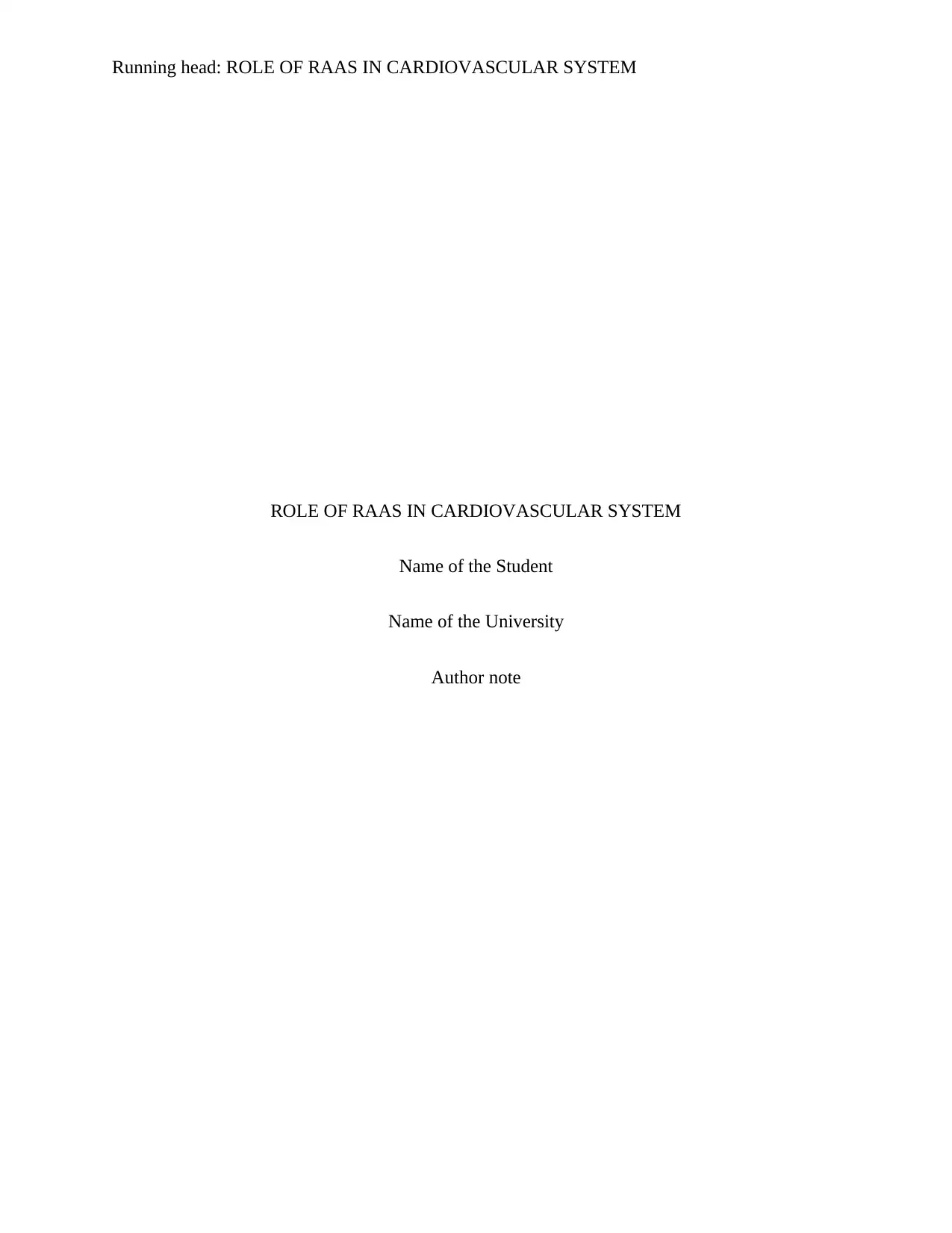
Running head: ROLE OF RAAS IN CARDIOVASCULAR SYSTEM
ROLE OF RAAS IN CARDIOVASCULAR SYSTEM
Name of the Student
Name of the University
Author note
ROLE OF RAAS IN CARDIOVASCULAR SYSTEM
Name of the Student
Name of the University
Author note
Paraphrase This Document
Need a fresh take? Get an instant paraphrase of this document with our AI Paraphraser
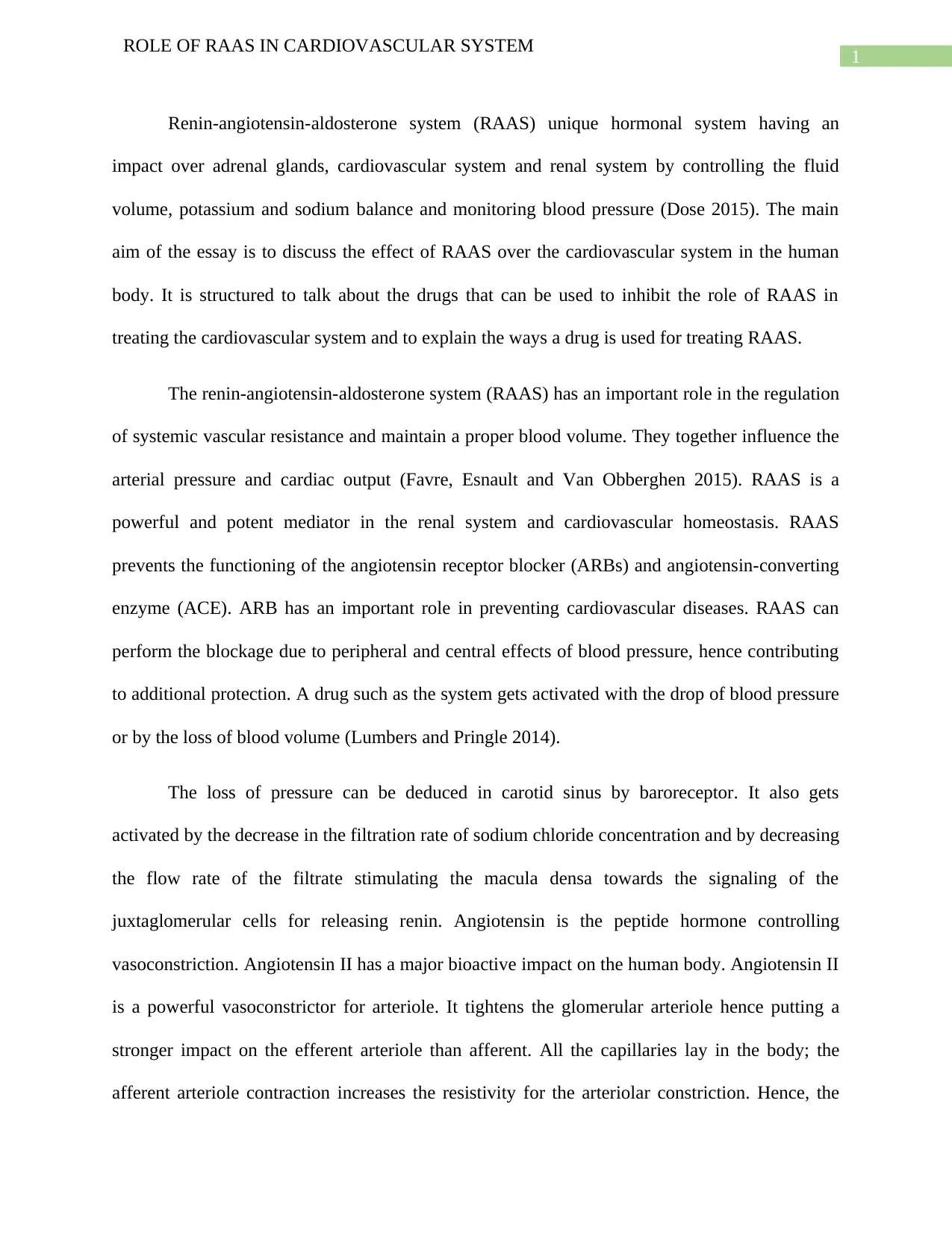
1
ROLE OF RAAS IN CARDIOVASCULAR SYSTEM
Renin-angiotensin-aldosterone system (RAAS) unique hormonal system having an
impact over adrenal glands, cardiovascular system and renal system by controlling the fluid
volume, potassium and sodium balance and monitoring blood pressure (Dose 2015). The main
aim of the essay is to discuss the effect of RAAS over the cardiovascular system in the human
body. It is structured to talk about the drugs that can be used to inhibit the role of RAAS in
treating the cardiovascular system and to explain the ways a drug is used for treating RAAS.
The renin-angiotensin-aldosterone system (RAAS) has an important role in the regulation
of systemic vascular resistance and maintain a proper blood volume. They together influence the
arterial pressure and cardiac output (Favre, Esnault and Van Obberghen 2015). RAAS is a
powerful and potent mediator in the renal system and cardiovascular homeostasis. RAAS
prevents the functioning of the angiotensin receptor blocker (ARBs) and angiotensin-converting
enzyme (ACE). ARB has an important role in preventing cardiovascular diseases. RAAS can
perform the blockage due to peripheral and central effects of blood pressure, hence contributing
to additional protection. A drug such as the system gets activated with the drop of blood pressure
or by the loss of blood volume (Lumbers and Pringle 2014).
The loss of pressure can be deduced in carotid sinus by baroreceptor. It also gets
activated by the decrease in the filtration rate of sodium chloride concentration and by decreasing
the flow rate of the filtrate stimulating the macula densa towards the signaling of the
juxtaglomerular cells for releasing renin. Angiotensin is the peptide hormone controlling
vasoconstriction. Angiotensin II has a major bioactive impact on the human body. Angiotensin II
is a powerful vasoconstrictor for arteriole. It tightens the glomerular arteriole hence putting a
stronger impact on the efferent arteriole than afferent. All the capillaries lay in the body; the
afferent arteriole contraction increases the resistivity for the arteriolar constriction. Hence, the
ROLE OF RAAS IN CARDIOVASCULAR SYSTEM
Renin-angiotensin-aldosterone system (RAAS) unique hormonal system having an
impact over adrenal glands, cardiovascular system and renal system by controlling the fluid
volume, potassium and sodium balance and monitoring blood pressure (Dose 2015). The main
aim of the essay is to discuss the effect of RAAS over the cardiovascular system in the human
body. It is structured to talk about the drugs that can be used to inhibit the role of RAAS in
treating the cardiovascular system and to explain the ways a drug is used for treating RAAS.
The renin-angiotensin-aldosterone system (RAAS) has an important role in the regulation
of systemic vascular resistance and maintain a proper blood volume. They together influence the
arterial pressure and cardiac output (Favre, Esnault and Van Obberghen 2015). RAAS is a
powerful and potent mediator in the renal system and cardiovascular homeostasis. RAAS
prevents the functioning of the angiotensin receptor blocker (ARBs) and angiotensin-converting
enzyme (ACE). ARB has an important role in preventing cardiovascular diseases. RAAS can
perform the blockage due to peripheral and central effects of blood pressure, hence contributing
to additional protection. A drug such as the system gets activated with the drop of blood pressure
or by the loss of blood volume (Lumbers and Pringle 2014).
The loss of pressure can be deduced in carotid sinus by baroreceptor. It also gets
activated by the decrease in the filtration rate of sodium chloride concentration and by decreasing
the flow rate of the filtrate stimulating the macula densa towards the signaling of the
juxtaglomerular cells for releasing renin. Angiotensin is the peptide hormone controlling
vasoconstriction. Angiotensin II has a major bioactive impact on the human body. Angiotensin II
is a powerful vasoconstrictor for arteriole. It tightens the glomerular arteriole hence putting a
stronger impact on the efferent arteriole than afferent. All the capillaries lay in the body; the
afferent arteriole contraction increases the resistivity for the arteriolar constriction. Hence, the
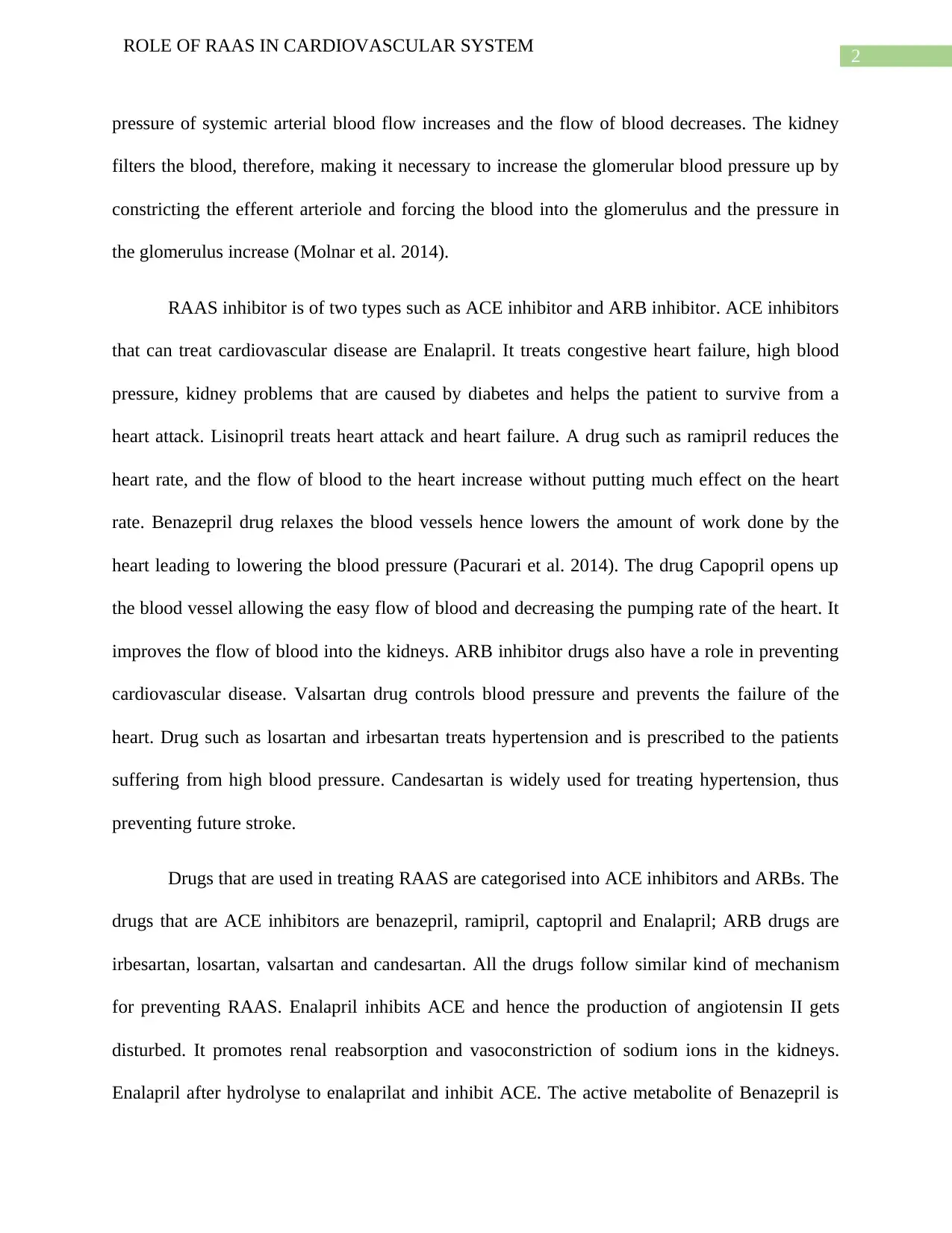
2
ROLE OF RAAS IN CARDIOVASCULAR SYSTEM
pressure of systemic arterial blood flow increases and the flow of blood decreases. The kidney
filters the blood, therefore, making it necessary to increase the glomerular blood pressure up by
constricting the efferent arteriole and forcing the blood into the glomerulus and the pressure in
the glomerulus increase (Molnar et al. 2014).
RAAS inhibitor is of two types such as ACE inhibitor and ARB inhibitor. ACE inhibitors
that can treat cardiovascular disease are Enalapril. It treats congestive heart failure, high blood
pressure, kidney problems that are caused by diabetes and helps the patient to survive from a
heart attack. Lisinopril treats heart attack and heart failure. A drug such as ramipril reduces the
heart rate, and the flow of blood to the heart increase without putting much effect on the heart
rate. Benazepril drug relaxes the blood vessels hence lowers the amount of work done by the
heart leading to lowering the blood pressure (Pacurari et al. 2014). The drug Capopril opens up
the blood vessel allowing the easy flow of blood and decreasing the pumping rate of the heart. It
improves the flow of blood into the kidneys. ARB inhibitor drugs also have a role in preventing
cardiovascular disease. Valsartan drug controls blood pressure and prevents the failure of the
heart. Drug such as losartan and irbesartan treats hypertension and is prescribed to the patients
suffering from high blood pressure. Candesartan is widely used for treating hypertension, thus
preventing future stroke.
Drugs that are used in treating RAAS are categorised into ACE inhibitors and ARBs. The
drugs that are ACE inhibitors are benazepril, ramipril, captopril and Enalapril; ARB drugs are
irbesartan, losartan, valsartan and candesartan. All the drugs follow similar kind of mechanism
for preventing RAAS. Enalapril inhibits ACE and hence the production of angiotensin II gets
disturbed. It promotes renal reabsorption and vasoconstriction of sodium ions in the kidneys.
Enalapril after hydrolyse to enalaprilat and inhibit ACE. The active metabolite of Benazepril is
ROLE OF RAAS IN CARDIOVASCULAR SYSTEM
pressure of systemic arterial blood flow increases and the flow of blood decreases. The kidney
filters the blood, therefore, making it necessary to increase the glomerular blood pressure up by
constricting the efferent arteriole and forcing the blood into the glomerulus and the pressure in
the glomerulus increase (Molnar et al. 2014).
RAAS inhibitor is of two types such as ACE inhibitor and ARB inhibitor. ACE inhibitors
that can treat cardiovascular disease are Enalapril. It treats congestive heart failure, high blood
pressure, kidney problems that are caused by diabetes and helps the patient to survive from a
heart attack. Lisinopril treats heart attack and heart failure. A drug such as ramipril reduces the
heart rate, and the flow of blood to the heart increase without putting much effect on the heart
rate. Benazepril drug relaxes the blood vessels hence lowers the amount of work done by the
heart leading to lowering the blood pressure (Pacurari et al. 2014). The drug Capopril opens up
the blood vessel allowing the easy flow of blood and decreasing the pumping rate of the heart. It
improves the flow of blood into the kidneys. ARB inhibitor drugs also have a role in preventing
cardiovascular disease. Valsartan drug controls blood pressure and prevents the failure of the
heart. Drug such as losartan and irbesartan treats hypertension and is prescribed to the patients
suffering from high blood pressure. Candesartan is widely used for treating hypertension, thus
preventing future stroke.
Drugs that are used in treating RAAS are categorised into ACE inhibitors and ARBs. The
drugs that are ACE inhibitors are benazepril, ramipril, captopril and Enalapril; ARB drugs are
irbesartan, losartan, valsartan and candesartan. All the drugs follow similar kind of mechanism
for preventing RAAS. Enalapril inhibits ACE and hence the production of angiotensin II gets
disturbed. It promotes renal reabsorption and vasoconstriction of sodium ions in the kidneys.
Enalapril after hydrolyse to enalaprilat and inhibit ACE. The active metabolite of Benazepril is
⊘ This is a preview!⊘
Do you want full access?
Subscribe today to unlock all pages.

Trusted by 1+ million students worldwide
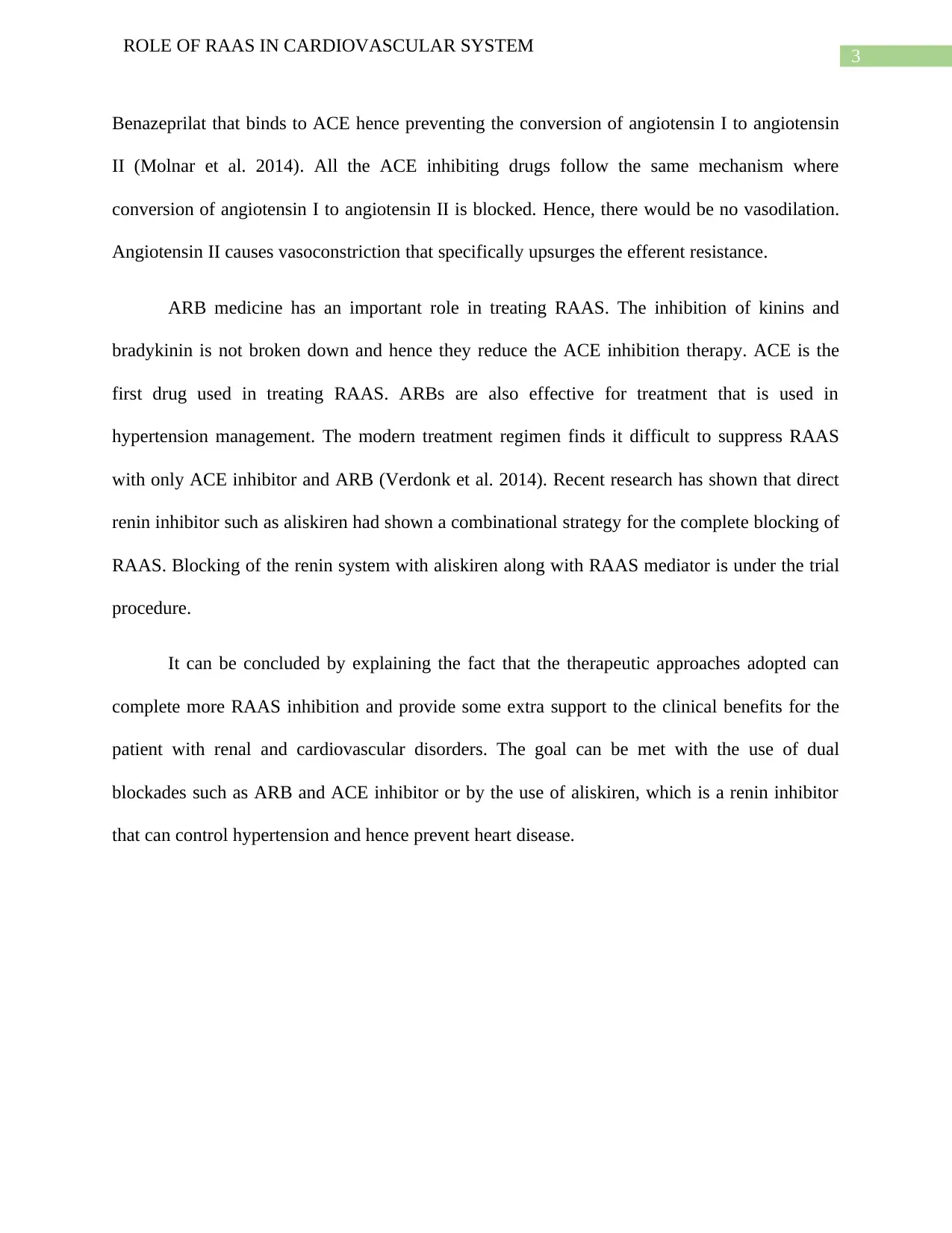
3
ROLE OF RAAS IN CARDIOVASCULAR SYSTEM
Benazeprilat that binds to ACE hence preventing the conversion of angiotensin I to angiotensin
II (Molnar et al. 2014). All the ACE inhibiting drugs follow the same mechanism where
conversion of angiotensin I to angiotensin II is blocked. Hence, there would be no vasodilation.
Angiotensin II causes vasoconstriction that specifically upsurges the efferent resistance.
ARB medicine has an important role in treating RAAS. The inhibition of kinins and
bradykinin is not broken down and hence they reduce the ACE inhibition therapy. ACE is the
first drug used in treating RAAS. ARBs are also effective for treatment that is used in
hypertension management. The modern treatment regimen finds it difficult to suppress RAAS
with only ACE inhibitor and ARB (Verdonk et al. 2014). Recent research has shown that direct
renin inhibitor such as aliskiren had shown a combinational strategy for the complete blocking of
RAAS. Blocking of the renin system with aliskiren along with RAAS mediator is under the trial
procedure.
It can be concluded by explaining the fact that the therapeutic approaches adopted can
complete more RAAS inhibition and provide some extra support to the clinical benefits for the
patient with renal and cardiovascular disorders. The goal can be met with the use of dual
blockades such as ARB and ACE inhibitor or by the use of aliskiren, which is a renin inhibitor
that can control hypertension and hence prevent heart disease.
ROLE OF RAAS IN CARDIOVASCULAR SYSTEM
Benazeprilat that binds to ACE hence preventing the conversion of angiotensin I to angiotensin
II (Molnar et al. 2014). All the ACE inhibiting drugs follow the same mechanism where
conversion of angiotensin I to angiotensin II is blocked. Hence, there would be no vasodilation.
Angiotensin II causes vasoconstriction that specifically upsurges the efferent resistance.
ARB medicine has an important role in treating RAAS. The inhibition of kinins and
bradykinin is not broken down and hence they reduce the ACE inhibition therapy. ACE is the
first drug used in treating RAAS. ARBs are also effective for treatment that is used in
hypertension management. The modern treatment regimen finds it difficult to suppress RAAS
with only ACE inhibitor and ARB (Verdonk et al. 2014). Recent research has shown that direct
renin inhibitor such as aliskiren had shown a combinational strategy for the complete blocking of
RAAS. Blocking of the renin system with aliskiren along with RAAS mediator is under the trial
procedure.
It can be concluded by explaining the fact that the therapeutic approaches adopted can
complete more RAAS inhibition and provide some extra support to the clinical benefits for the
patient with renal and cardiovascular disorders. The goal can be met with the use of dual
blockades such as ARB and ACE inhibitor or by the use of aliskiren, which is a renin inhibitor
that can control hypertension and hence prevent heart disease.
Paraphrase This Document
Need a fresh take? Get an instant paraphrase of this document with our AI Paraphraser
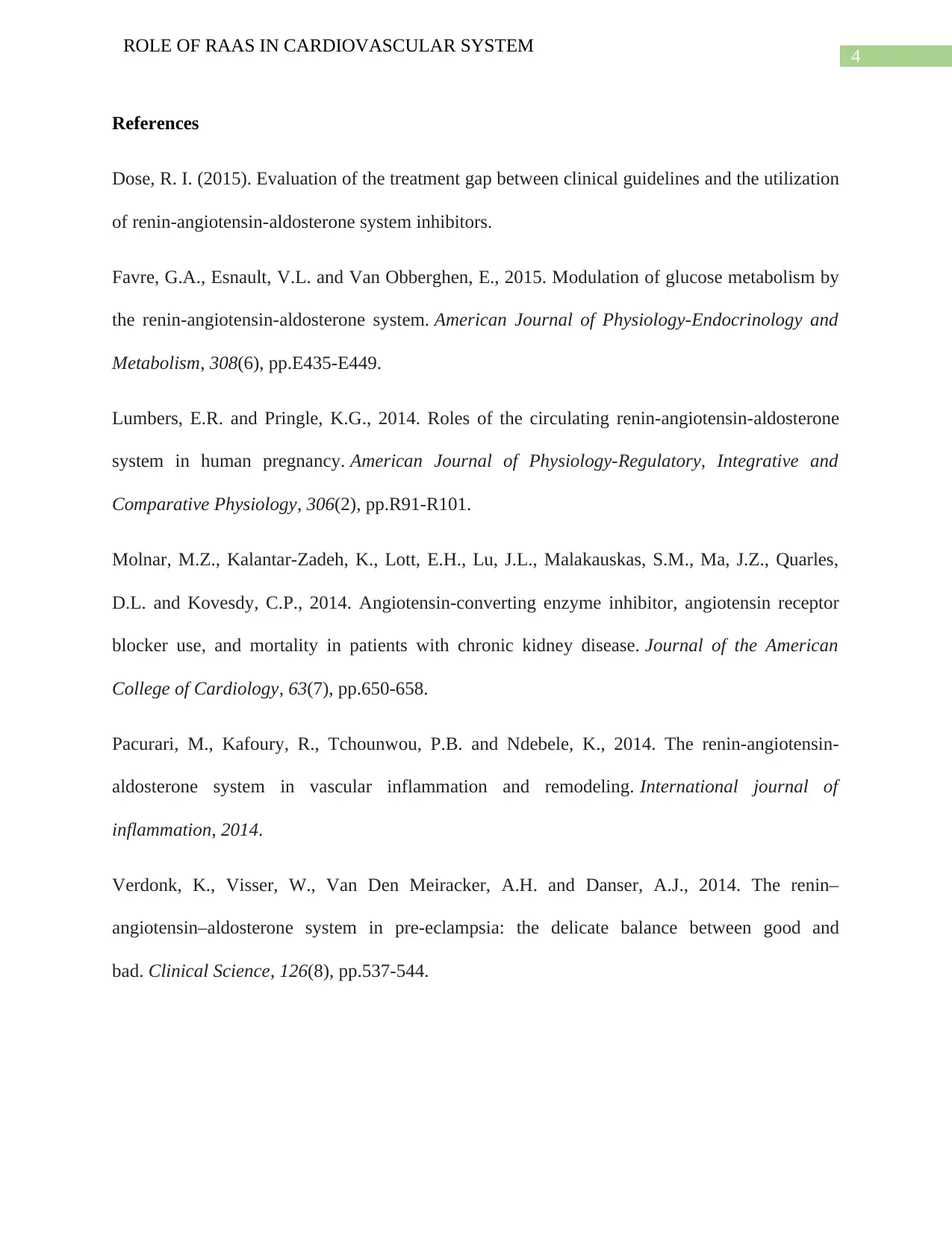
4
ROLE OF RAAS IN CARDIOVASCULAR SYSTEM
References
Dose, R. I. (2015). Evaluation of the treatment gap between clinical guidelines and the utilization
of renin-angiotensin-aldosterone system inhibitors.
Favre, G.A., Esnault, V.L. and Van Obberghen, E., 2015. Modulation of glucose metabolism by
the renin-angiotensin-aldosterone system. American Journal of Physiology-Endocrinology and
Metabolism, 308(6), pp.E435-E449.
Lumbers, E.R. and Pringle, K.G., 2014. Roles of the circulating renin-angiotensin-aldosterone
system in human pregnancy. American Journal of Physiology-Regulatory, Integrative and
Comparative Physiology, 306(2), pp.R91-R101.
Molnar, M.Z., Kalantar-Zadeh, K., Lott, E.H., Lu, J.L., Malakauskas, S.M., Ma, J.Z., Quarles,
D.L. and Kovesdy, C.P., 2014. Angiotensin-converting enzyme inhibitor, angiotensin receptor
blocker use, and mortality in patients with chronic kidney disease. Journal of the American
College of Cardiology, 63(7), pp.650-658.
Pacurari, M., Kafoury, R., Tchounwou, P.B. and Ndebele, K., 2014. The renin-angiotensin-
aldosterone system in vascular inflammation and remodeling. International journal of
inflammation, 2014.
Verdonk, K., Visser, W., Van Den Meiracker, A.H. and Danser, A.J., 2014. The renin–
angiotensin–aldosterone system in pre-eclampsia: the delicate balance between good and
bad. Clinical Science, 126(8), pp.537-544.
ROLE OF RAAS IN CARDIOVASCULAR SYSTEM
References
Dose, R. I. (2015). Evaluation of the treatment gap between clinical guidelines and the utilization
of renin-angiotensin-aldosterone system inhibitors.
Favre, G.A., Esnault, V.L. and Van Obberghen, E., 2015. Modulation of glucose metabolism by
the renin-angiotensin-aldosterone system. American Journal of Physiology-Endocrinology and
Metabolism, 308(6), pp.E435-E449.
Lumbers, E.R. and Pringle, K.G., 2014. Roles of the circulating renin-angiotensin-aldosterone
system in human pregnancy. American Journal of Physiology-Regulatory, Integrative and
Comparative Physiology, 306(2), pp.R91-R101.
Molnar, M.Z., Kalantar-Zadeh, K., Lott, E.H., Lu, J.L., Malakauskas, S.M., Ma, J.Z., Quarles,
D.L. and Kovesdy, C.P., 2014. Angiotensin-converting enzyme inhibitor, angiotensin receptor
blocker use, and mortality in patients with chronic kidney disease. Journal of the American
College of Cardiology, 63(7), pp.650-658.
Pacurari, M., Kafoury, R., Tchounwou, P.B. and Ndebele, K., 2014. The renin-angiotensin-
aldosterone system in vascular inflammation and remodeling. International journal of
inflammation, 2014.
Verdonk, K., Visser, W., Van Den Meiracker, A.H. and Danser, A.J., 2014. The renin–
angiotensin–aldosterone system in pre-eclampsia: the delicate balance between good and
bad. Clinical Science, 126(8), pp.537-544.
1 out of 5
Related Documents
Your All-in-One AI-Powered Toolkit for Academic Success.
+13062052269
info@desklib.com
Available 24*7 on WhatsApp / Email
![[object Object]](/_next/static/media/star-bottom.7253800d.svg)
Unlock your academic potential
Copyright © 2020–2026 A2Z Services. All Rights Reserved. Developed and managed by ZUCOL.





